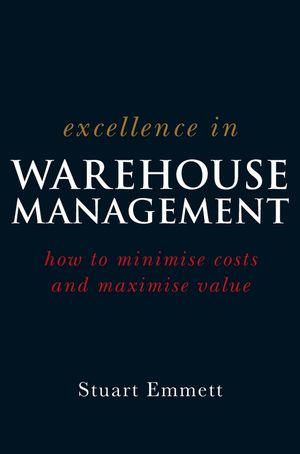Excellence in Warehouse Management: How to Minimise Costs and Maximise ValueISBN: 978-0-470-01531-5
Paperback
320 pages
June 2005
 This is a Print-on-Demand title. It will be printed specifically to fill your order. Please allow an additional 10-15 days delivery time. The book is not returnable.
|
||||||
Introduction ix
Abbreviations xi
Acknowledgements xv
1: The Role of Warehousing and Stores 1
Warehousing and the supply chain 1
Training topics 2
Definitions 4
Strategic aspects of warehousing 5
Customers 7
The value chain 9
Warehouse location 12
Modern warehouse operations 14
World-class warehousing 21
Conclusion 24
2: Inventory, Stock Analysis and Classifying Products 25
Product classification 25
Demand analysis 26
ABC analysis 30
Product coding 34
Product handling groups 34
Inventory management: why hold stock? 35
Inventory costs and service 37
Lead time 41
Demand forecasting 46
Inventory and statistics 48
How much stock should be held? 51
Replenishment methods 54
Questions about inventory 65
Appendix 72
3: Stock Control 75
Stock inaccuracy 75
Continuous or periodic stock checking 77
COPYRIGHTED MATERIAL
Stock control 79
Security and preventing loss 81
Information security 84
Training topics 86
4: The Warehouse and Operational Principles 88
Warehouse structure 88
Warehouse operations 90
Receiving 91
Location methods in the warehouse 96
Picking options 97
Customer orders 99
Methods of picking 100
Despatching activity 110
Organising for flow 111
5: Equipment 112
Fork-lift trucks 112
Racking/shelving 119
The aisle width decision 125
6: Warehouse Information Communications Technology 128
Importance of information 128
Decision-making and ICT 132
Improvements with ICT 133
Warehouse ICT applications 134
Systems implementation 149
7: Regulations 153
Health and safety at work 153
Management of health and safety 154
Health and safety arrangements 158
Warehouse health and safety risks 160
Risk assessments 164
Fork-lift trucks: health and safety 166
8: Productivity, Cost and Service 173
Framework for analysis 173
Key costs 174
Key productivity drivers 176
Basic improvements 179
Understanding productivity 189
Determining pricing and charging 192
Customer service 195
Added value 203
Warehouse layout 208
Training topics 210
9: Outsourcing 212
Users’ views of third parties and the marketplace 212
Selecting third parties 220
Training topics 225
10: People Management 227
Company culture 227
Management 231
Work objectives and performance 235
Motivating people 245
Empowering 251
Teams 252
Communication 254
Managing change 255
Warehouse picking operatives 262
Training topics 264
11: Developments and Trends 268
Supply chain impacts on stores and warehousing 268
Global logistics 270
Reverse logistics and customer returns 271
Risk 277
Roads 278
Legislation 279
Technology 279
People development 279
Political influences 280
The supply chain 282
Warehouse aims/ideals 286
Useful Information and Websites 288
Bibliography 290
Index 292



